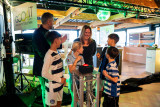As Covid-19 continues to wreak havoc on public health and local economies around the world, one over-looked Corona casualty has been our collective space. Here in densely populated Amsterdam we are slowly, carefully, cautiously transitioning into a new urban landscape. As a smart city architect and designer, I wanted to start exploring this new 1.5 meter unit on the Marineterrein, Amsterdam’s inner-city testbed for future living environments. Using a computer fan, dental mirror, lego, and yes - a Laser pointer, I set out with my son to visualize what social distancing means on footbridges, fitness gardens, picnic tables, park benches, stairs, swimming docks and familiar Amsterdam furniture. Watch the video and learn how to build your own at https://www.tapp.nl/blog/mapping-social-distance-in-an-inner-city-testbed
Want to receive updates like this in your inbox?
Get notified about new updates, opportunities or events that match your interests.
Maybe you will also like these updates
Sensemakers Workshop Meshtastic, configure your own node (for Amsterdam-wide coverage)

Join us to learn to understand the concept of Meshtastic, an open source, off grid, decentralized, mesh network build to run on affordable low-power devices!
Prepare and configure your own device as to contribute to Amsterdam wide coverage, or just for fun / to chat:-)
The workshop is based on this device: https://nl.aliexpress.com/item/1005007752194012.html Of course you may bring a different device, it only might take a little extra effort on your part if the settings are different. We will try to help of course!
You don't have to rsvp via meetup, the workshop is from 19-21h in the Makerspace of the OBA and you can just walk in!
OBA: Oosterdokskade 143, 1011DL Amsterdam
Sensemakers X-Mas Workshop

For our end-of-the year event we have some extra opportunities to build, create and even program your own souvenir to take home!
Please if you want to make and take home the Xmas lights you see in the picture, the kit costs 25,- (we also have 2 Pay-It-Forward kits). Of course you can also work in other small projects or 3D print a small Xmas tree or make (for children!) a self designed wooden lamps!
You don't have to rsvp via meetup, the workshop is from 19-21h in the Makerspace of the OBA and you can just walk in!
OBA: Oosterdokskade 143 1011DL Amsterdam
Amsterdam and Haarlem launch groundbreaking sustainable artificial turf pitch innovations

The pioneering innovations were presented of the Scale Up Future-proof artificial turf pitches project, a collaboration between Amsterdam and Haarlem focused on sustainable artificial turf pitches. Over the next few years, more than 250 sports pitches in both cities will be transformed into circular, energy-generating and climate-adaptive sports venues. These artificial turf pitches can not only generate and store energy, but also involve smart water management. An approach that is globally relevant for urban sports infrastructure.
Three consortia collaborate on the sport pitch of the future
The three selected consortia Antea Sport, EnergieVeld and GOO4iT together comprise more than 15 market players. They join forces within this innovation partnership, where there is room for long-term collaboration, co-creation and scalable innovation. The pioneering solutions will make it possible to cool down sport pitches on warm days, help dispose of and collect rainwater, make the pitches more pleasant for the users and possibly even generate energy for the surrounding area. Find out how these innovations are shaping the sport pitch of the future here.
Two municipalities: joint procurement
The Scale Up Future-proof artificial turf pitches project is a unique collaboration between two municipalities and market players. The municipalities jointly procure pooling their purchasing power and use an innovation partnership to challenge the market to test and scale up innovative and sustainable solutions. In doing so, the solutions are also scalable and transferable to other cities in the Netherlands and Europe.
From prototype to pilot fields
The first prototype fields will be constructed in Amsterdam and Haarlem in 2026, in different capacities and combining multiple innovations, where they will be extensively tested and monitored for a year. Successful concepts are then scaled up to full-scale pilot pitches and tested and monitored for another year. This will form the basis for the new standard of sustainable sports pitches, with potential for adoption in other cities around the world. At the same time, existing pitches are already being improved with the most sustainable solutions available, making an immediate impact from the start. The project thus shows how cooperation between municipalities and market players can lead to innovative, climate-proof sports infrastructure with international relevance.
Join us
This project provides cities worldwide a blueprint for sustainable, smart, and future-proof artificial turf pitches. Interested municipalities and industry partners can get in touch and subscribe to our news updates by sending an e-mail to: sportveldvandetoekomst@amsterdam.nl.


Smart visualisation tool. Kudos.